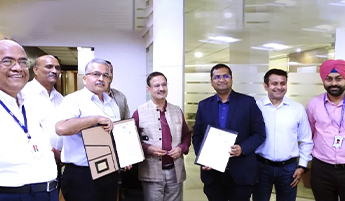The one question that always intrigues me as a tech enthusiast is what does the future of the Internet of Things hold? The possibilities are boundless and many ground-breaking technologies have emerged over the past few years. With the cut-throat competition in this field, the big players in this space are striding forward and coming up with new smart technology that would make human life much easier in the upcoming days. One such groundbreaking technology is the Ultra-Wide Band (UWB), an ultra-low-power wireless technology that is currently the talk of the town.
It can be used to transfer a huge amount of data within a small distance. UWB has numerous advantages over traditional wireless technologies like BLE, Wi-fi, Zigbee, etc. UWB can transfer up to 1Gb/ps of data over a short distance in a short amount of time.
UWB stands in the limelight over its counterparts as it has low frequencies included in its broad spectrum which has long wavelengths. This makes it possible for these waves to penetrate through a variety of materials including walls, human bodies, ground, etc. It consumes less power and has a wider range of spectrum from 3.1GHz to 10.6GHz.
UWB based tech is not just limited to a specific field or domain but can be expanded to major verticals of all the industries where it can provide cost-efficient yet reliable solutions. This opens up a path for Next-Gen avenues where UWB Tech has tremendous potential, like:
- Wireless Personal Area Network
UWB has high bandwidth and high time resolution which makes the signals from UWB much more robust to interferences and multipath fading. High-Quality Multimedia files can be transferred over a large channel capacity and wide bandwidth. With the introduction of UWBchips in the new Apple iPhone family, the feature like Airdrop (used for sharing multimedia files), has become significantly smart as well as fast. A user can point his/her iPhone towards someone else’s, and the iPhone would prioritize that device so that one can share the files seamlessly. Other major players in the smartphone market are also trying to introduce this tech in their line of products. These endeavors have opened up new channels in field of IoT where it can not only enable the smartphones but also other smart devices.
- Medical
The signals emitted by the UWB can penetrate a variety of materials which makes it an excellent commodity in the field of applied medicine. Due to the high-intensity pulses used in UWB Tech, it is possible to use UWB radar in the medical field to monitor patient motions and measurements remotely. Cardiology Imaging is another such example of UWB being used in the medical field where the UWB pulse can be directed to the human’s body and the reflected pulse from the heart can be recorded by the UWB receiver, thus helping in monitoring the activities of the heart.
The same can be applied in the following regions:
- Pneumology Imaging
- Obstetrics Imaging
- Ear-Nose-Throat Imaging
- Military
UWB has various applications in the field of Military equipment as it helps in communication and high data transfer in a short period with a reduced installation cost & time over the conventional wired solutions. It can be installed in manned & unmanned vehicles as it helps cut down the issues related to cable weight, space, and complexity of installation and modifying caballing enabled solutions.
- Ground Penetrating Radar (GPR)
Enabled by Accurate Time information and wider bandwidth, UWB has extensive use in the field of object detection under the ground. UWB can be connected to the GPS and can be used to draw maps of underground pipelines and is intensively used in the field to detect mines
- Home Networking & Electronics
With the boom in wireless technology in Home electronics, this is the most promising commercial application area. Many manufacturers are researching how to weave various devices like multimedia players, Camcorders, Speakers, etc. in a home together using UWB which would help reduce the cluttering of wires & cables in the living space.
- Precise Indoor Positioning
Thanks to UWB, the Real-Time Locating Systems (RTLS) have received a major buff. The UWB enables the RTLS to provide precise data of where the user/equipment is positioned inside a room and which is further facilitated by the high speed of data transfer which enables precise yet faster results.
- Industrial Equipment
Other than these UWB can also be used for managing & keeping track of the various equipment used in industry like:
- Vehicle Safety: Here the user can manage vehicle speed, designated traveling area, and directions.
- Personnel safety: Helps to improve safety among people, equipment, and areas (Can alert the user to maintain a safe distance from potentially dangerous areas within industrial space).
- Operation Management: It can be used to monitor operations & find out inefficiencies in the process within industrial space.
- Asset Tracking: Full asset traceability to reduce shrinkage rate & search time.
The big fishes of the tech markets are taking an extensive dive into this field and are keen on making a product that is enabled by this technology which would make their device smart, robust, and future-ready. A few of the key market players being Apple, Samsung, NXP, Decawave have made significant progress in this field and have benchmarking results, showcasing the real potential of UWB in the upcoming Tech Market over the years to come. Apple & Samsung have already enabled their flagship Smart-Phones with UWB which allows users to instantly transmit files & photos to their family, friends, and colleagues. Samsung and NXP have partnered and are already working on a new set of features like Digital Key based on this tech, which would enable the Smartphones to open up the front doors without the use of physical keys.
VVDN Technologies is at par with the latest trend and has expertise in UWB RF testing along with labs equipped with the latest equipment to test & validate this technology. VVDN can fine-tune these solutions as per one’s needs & demands on the go. UWB has a major stake in the upcoming future and VVDN is working on UWB based tech and is striving to achieve cost-efficient yet reliable UWB based solutions for its customers.
Indeed, the possibilities of UWB are huge and VVDN can facilitate various OEMs with its expertise and experience in this field.





















